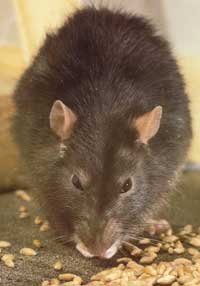OFC 2010: Climate change may mean more rats

Climate change is likely to trigger an even bigger rat population, according to the Campaign for Responsible Rodenticide Use (CRRU). It cited a recent CRRU survey of farmers and countryside managers in which 61% of the respondents reported a rising rat population already and 74% believing that climate change would exacerbate the problem. The survey is corroborated by the National Pest Technicians Association (NPTA), which found a 15% year-on-year increase in treatments in local authorities for rat infestations. Exhibiting at the Oxford Farming Conference for the first time, CRRU said that rat control would become an even bigger issue as the world sought to feed 50% more people in the next 40 years. According to CRRU chairman Dr Alan Buckle, the UK rural rat population consumes an estimated 200t of food a day that would otherwise be destined for humans. One in every two farm fires, he adds, is believed to be started by rat damage causing electricity cables to short. Preventing or limiting the development of rats with resistance to second generation anticoagulant rodenticides is a big concern said Dr Buckle. “If widespread resistance were to develop, our ability to control rats would be severely compromised, with potentially serious effects on UK agricultural production.” That is behind the CRRU’s BASIS-accredited Wildlife Aware training course for those using and advising on rodenticides. To find out more about this and controlling rats responsible visit its website
• One rat produces about 40 faecal pellets and 15ml of urine each day, or 14,600 and five litres respectively per year.
• Salmonella, leptospira, toxoplasma, listeria, campylobacter and cryptosporidium are some of the highly pathogenic organisms carried by rats.
For more from the Oxford Farming Conference click here.
